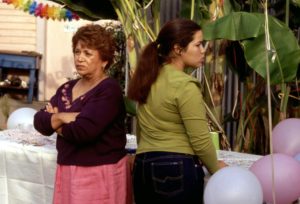
REAL WOMEN HAVE CURVES, Lupe Ontiveros, America Ferrera, 2002, (c) HBO
The movie Real Women have Curves depicts the life of Anna, a bright student, from the inner city of Los Angeles. The opening scene of the movie depicts Anna wiping down the windows, an example of domestication, falling within the Chicano gender roles. Immediately Anna and her mother clash because her mother would like for Anna to tend to her, yet it’s Anna last day of high school. Anna leaves the house stating “smart women could contribute to the world,” shows her directly challenging the Chicano gender roles, by stating that she too can essential to society.
At school, her English professor reminds Anna about the college applications and she tells him her family can’t afford college and he should not waste his time on her. After school, Anna quits her job and when she arrives home her mother is furious over it. During the confrontation, an unexpected visit from her English professor creates more animosity with the family. The professor expresses his support for Anna’s higher education and automatically her mother says she has a job at the factory the next day. Her father expresses how she needs to contribute and provide for the family. This scene demonstrates Chicano family values of contributing to everyone, including the sacrifices for oneself. When Anna does get accepted to Columbia University, her family sees it as an abandonment of them. She is not only abandoning them physically but financially and emotionally, by her mother reminding her about her abuelito.
A scene between the Anna parents shows her mother complaining about Anna not doing any domestic jobs, calling her lazy for not cleaning or cooking. Illustrates the Chicano gender roles of women obtaining the domestic duties that her mother was upholding her to. What was unique about the scene was the father suggesting that Anna should attend college and learn. Anna’s father was breaking away from the typical Chicano gender roles and instead of portraying a “machismo” attitude, he gave encouragement for Anna’s education. However, her mother rebuttals that she will teach Anna “learn” by showing her how to cook, sew, take care of her kids, and husband. Once again her mother is applying the Chicano gender role to her daughter. Her mother says it is not fair that she was working since 13, where Anna began at 18, and its time for her to work. That statement could be seen as her mother envious of her daughter’s opportunity for education and growth, so she doesn’t approve.
A scene at the clothing factory shows women doing a domestic job, sewing dresses, and not always paid on time. They work in a hot environment, Anna’s job was to steam the dresses, and the only time her mother showed her compassion was when she burned her finger. Her mother tended to the finger, singing a familiar song, “ Sana sana colita de rana,” a song I too have heard growing up.
A connecting theme of the movie was purity, Anna’s mother stressed the importance of a women’s virginity. Anna challenge her mother, “ Why does a women virginity matter? We have thoughts, ideas, a mind of our own,” addressing the typical Chicano gender roles of the women contained within her own position. The movie connects with gender roles were not only displayed in the acting but also in the music. Throughout the film the songs had a message of both the struggles and empowerment of women. The songs Chica Dificil and Luto by Aterciopelados discuss the “issues” men face being with a strong and difficult women, yet it is worth-wild. Finally when Anna loses her virginity, disobeying her mother’s values of purity. Her mother is upset with Anna’s decision, there is “more to me than what’s in between my legs,” says Anna.
At the end of the film, Anna pursued her education in New York. For Anna to show her mother that her education, not her virginity would help define her purpose of life.Anna is an example of resilience, determination, and the constantly pushing of gender roles by not conforming to them.

Ohhhhh, the struggle is realllllll. I identify with this film on so many levels-thank you for deconstructing the film and calling out the isms that our pervasive in Chicana/o family structure. The rigid gender roles ascribe Chicanas to menial positions such as the women who sew dresses for a living in a factory. While this is okay for some women who want to be in this role, there are other women such as myself, and sounds like you, who want more than sewing fabric for our futures. I am a woman, like Anna, who knows the importance of education, and the importance of going onto to undergraduate, graduate school, and professional law or PhD degrees. Yes, we can-Yes, we will-WE ARE POWER-we will continue to disrupt the stereotypical Chicana seen in these films. It drives me nuts that we are often portrayed as the maids, women who only do domestic work, or “the virgins” who can not embrace there sexuality—DRIVES ME NUTS!